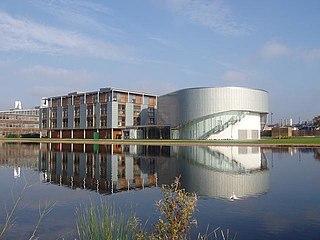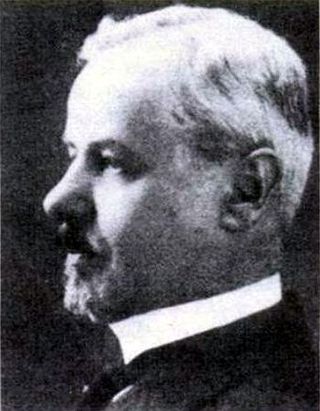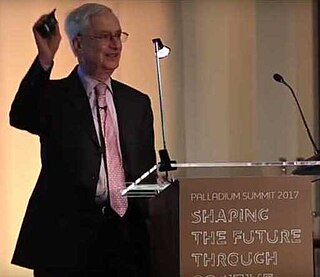Related Research Articles

Nottingham University Business School (NUBS) is the business school of the University of Nottingham, United Kingdom situated on the university's Jubilee Campus.

Alexander Hamilton Church was an English efficiency engineer, accountant and writer on accountancy and management, known for his seminal work of management and cost accounting.

Robert Samuel Kaplan is an American accounting academic, and Emeritus Professor of Leadership Development at the Harvard Business School. He is known as co-creator of Balanced Scorecard. together with David P. Norton.

The Accounting Hall of Fame is an award "recognizing accountants who are making or have made a significant contribution to the advancement of accounting" since the beginning of the 20th century. Inductees are from both accounting academia and practice. Since its inception in 1950 at The Ohio State University, it has honored 113 influential accounting professors, professional practitioners, and government and business accountants from the United States and other countries.
William Andrew Paton was an American accountancy scholar, known as founder of the American Accounting Association in 1916, and was founder and first editor of its flagship journal The Accounting Review.
Joel Dean (1906–1979) was an American economist best known for his contributions to corporate finance theory in general, and particularly to the area of capital budgeting. He is regarded as one of the founders of business economics. His work on pricing remains influential in marketing.
Stephen Addam Zeff is an American accounting historian, and Herbert S. Autrey Professor of Accounting at the Jesse H. Jones Graduate School of Business, Rice University, Houston, Texas, United States. He was inducted into the Accounting Hall of Fame in 2002.
William Wager Cooper was an American operations researcher, known as a father of management science and as "Mr. Linear Programming". He was the founding president of The Institute of Management Sciences, founding editor-in-chief of Auditing: A Journal of Practice and Theory, a founding faculty member of the Graduate School of Industrial Administration at the Carnegie Institute of Technology, founding dean of the School of Urban and Public Affairs at CMU, the former Arthur Lowes Dickinson Professor of Accounting at Harvard University, and the Foster Parker Professor Emeritus of Management, Finance and Accounting at the University of Texas at Austin.
Robert Newton Anthony was an American organizational theorist, and professor of management control at Harvard Business School, known for his work in the field of management control systems.
Richard G.J. Vangermeersch is an American economist, and Emeritus Professor of Accounting at the University of Rhode Island, particularly known for his History of Accounting: An International Encyclopedia, edited with Michael Chatfield.
Michael Chatfield (1930s-2004) was an American economist, accounting historian, and Emeritus Professor of Accounting at the Southern Oregon University, known for his work on the history of accounting and accounting thought, and particularly for his History of Accounting: An International Encyclopedia, edited with Richard Vangermeersch.
David Solomons was a British/American accounting scholar, known from his work on accounting and business management, its concepts, standards, history and politicization.
Murray Charles Wells is a New Zealand economist, top manager, and Emeritus Professor of Accounting at the University of Sydney, known for his work on the history of accountancy.
Henry Rand Hatfield was an American accountant and prominent pioneer in accounting education, known as author of the 1909 "Modern accounting : its principles and some of its problems."
Ananias Charles Littleton was an American accounting scholar and professor of accounting at the University of Illinois. He is known as prominent educator, and for his work on the history of accounting.
Carman George Blough was an American accountant, professor of accounting, and civil servant. He is described as "one of the most influential 'high priests' of the profession in the Twentieth Century." He was inducted into the Accounting Hall of Fame in 1954.
Harry Anson Finney was an American accountant, and Professor of accounting at the Northwestern University. He is known as prolific author in the field of accounting. who had written a leading textbook in accounting, entitled "Principles of accounting" (1935).
Roy Bernard Kester was an American accountant, and Professor of accounting at the Columbia University. He is known as a prolific author in the field of accounting.
Gary John Previts is an American accountant, a Distinguished University Professor at Case Western Reserve University and Professor of Accountancy in the Weatherhead School of Management. He is known for his work on the history of the theory and practice of accountancy.
Robert Henry Parker was a British accounting scholar, and Emeritus Professor at the University of Exeter, known for his work on "comparative international accounting" and the history of the accounting profession in Britain.
References
- ↑ Kaplan, Robert S. "The evolution of management accounting Archived 2014-12-22 at the Wayback Machine ," The Accounting Review, Vol 14, No 3. July 1986.
- ↑ Richard Vangermeersch. "Johnson, H. Thomas, 1938-" in: Michael Chatfield, Richard Vangermeersch, The History of Accounting (RLE Accounting): An International Encyclopedia. 2014. p. 354-355
- 1 2 3 H. Thomas Johnson profile at Portland State University. Accessed 10.02.2015
- ↑ H. Thomas Johnson (2002). Relevance Regained. Simon and Schuster. ISBN 978-1-4391-0589-4.